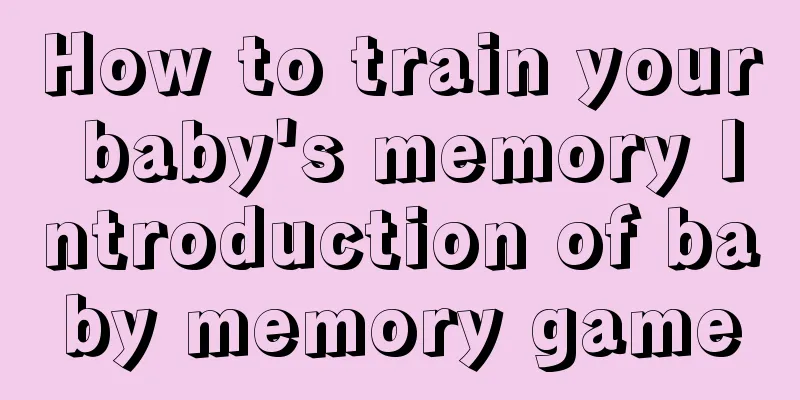How to train your baby's memory Introduction of baby memory game

|
How to train your baby's memory? Parents all hope that their children are smart and clever, so it is very important to train your baby's memory when he is young. Today, I will introduce several games about baby's memory. Do you want to know how to play the game? How to train your baby's memory1. Start by calling the name... Before talking to your baby, call out the baby's name first, which will attract the baby's attention more easily. With focused attention, the baby's memory will be enhanced over time. At the same time, you need to lay a good foundation for logical thinking, such as playing this game: sit with the baby facing forward, and the mother puts her hand to her ear to imitate making a phone call, and asks the baby: "Hello, who are you? Where do you live? What's your father's name?" and other questions, and guide the baby to answer in order. 2. Memory training before bed Research has found that the most effective time to improve a child's memory is before bedtime. Telling him stories or some common sense at this time will achieve the best learning effect. Use vivid, colorful, and brightly colored things as memory materials. Use these forms that interest your baby so that he can remember many things without realizing it. For example, let your baby look at a picture with several kinds of animals, and limit the time to finish looking at it. The time can be longer at the beginning, and then gradually shortened. After taking the picture away, let the baby say which animals are in the picture. If he can't remember much, you can classify the animals, such as how many kinds of beasts, birds, and fish there are, so that he can remember them faster. When telling stories and reading books to your baby, ask him to pay attention to remember the names of the characters in the story, and then let the baby recall each person's name. 3. Do memory exercises regularly 1. Start by calling the name... Before talking to your baby, call out the baby's name first, which will attract the baby's attention more easily. With focused attention, the baby's memory will be enhanced over time. At the same time, you need to lay a good foundation for logical thinking, such as playing this game: sit with the baby facing forward, and the mother puts her hand to her ear to imitate making a phone call, and asks the baby: "Hello, who are you? Where do you live? What's your father's name?" and other questions, and guide the baby to answer in order. 2. Memory training before bed Research has found that the most effective time to improve a child's memory is before bedtime. Telling him stories or some common sense at this time will achieve the best learning effect. Use vivid, colorful, and brightly colored things as memory materials. Use these forms that interest your baby so that he can remember many things without realizing it. For example, let your baby look at a picture with several kinds of animals, and limit the time to finish looking at it. The time can be longer at the beginning, and then gradually shortened. After taking the picture away, let the baby say which animals are in the picture. If he can't remember much, you can classify the animals, such as how many kinds of beasts, birds, and fish there are, so that he can remember them faster. When telling stories and reading books to your baby, ask him to pay attention to remember the names of the characters in the story, and then let the baby recall each person's name. 3. Do memory exercises regularly For children over 4 years old, mothers may try the "memory health exercise". As shown in the picture above, first find the "Tianzhu" and "Fengchi" points behind the head and neck, then put both hands behind the head and press these two points with the pulp of the thumb and index finger. Press for 5 seconds each time, suddenly increase the pressure, and then remove the thumb. After pressing 3-5 times, you will feel clear-headed. For adults, double the number of times. If you persist for a long time, it can relax the brain cells and play a certain role in alleviating the aging of brain cells, achieving the role of health care and improving memory. 4. Clear tasks + full understanding Tell your child: "Count the number of pots of flowers at home and tell your father tomorrow. If you get it right, I will reward you with XXX." The child will definitely remember it. Tell your child a story and first tell him: "Mom will tell you a story and you can tell it to your father later." This can also encourage the child to remember the story you told. The clear task and purpose of memory can increase the excitability of the relevant areas of the cerebral cortex and form a dominant excitation center, so that the memory is firm. At the same time, let the child fully understand and be familiar with the knowledge and methods, so that the new knowledge can be "hooked" with the original knowledge and experience in the brain. Once the hook is hung, it will be easier for the child to find a memory method that suits him. 5. Make use of games Most babies are actually willing to play memory games with their parents. During this parent-child time, everyone can relax and be happy, which improves memory. The game content should be adjusted and updated according to the baby's age. For example, for younger babies, we can ask them to number each toy and ask them to remember it. Then the mother picks up the numbers and shuffles them, and then asks the baby to put the original numbers on each toy, training the baby to match the numbers with the small animals one by one. For children over 4 years old, mothers may try the "memory health exercise". As shown in the picture above, first find the "Tianzhu" and "Fengchi" points behind the head and neck, then put both hands behind the head and press these two points with the pulp of the thumb and index finger. Press for 5 seconds each time, suddenly increase the pressure, and then remove the thumb. After pressing 3-5 times, you will feel clear-headed. For adults, double the number of times. If you persist for a long time, it can relax the brain cells and play a certain role in alleviating the aging of brain cells, achieving the role of health care and improving memory. 4. Clear tasks + full understanding Tell your child: "Count the number of pots of flowers at home and tell your father tomorrow. If you get it right, I will reward you with XXX." The child will definitely remember it. Tell your child a story and first tell him: "Mom will tell you a story and you can tell it to your father later." This can also encourage the child to remember the story you told. The clear task and purpose of memory can increase the excitability of the relevant areas of the cerebral cortex and form a dominant excitation center, so that the memory is firm. At the same time, let the child fully understand and be familiar with the knowledge and methods, so that the new knowledge can be "hooked" with the original knowledge and experience in the brain. Once the hook is hung, it will be easier for the child to find a memory method that suits him. 5. Make use of games Most babies are actually willing to play memory games with their parents. During this parent-child time, everyone can relax and be happy, which improves memory. The game content should be adjusted and updated according to the baby's age. For example, for younger babies, we can ask them to number each toy and ask them to remember it. Then the mother picks up the numbers and shuffles them, and then asks the baby to put the original numbers on each toy, training the baby to match the numbers with the small animals one by one. Games to improve children's memoryMemory is a treasure house of knowledge. With memory, intelligence can continue to develop and knowledge can continue to accumulate. Here are some games that can help enhance children's memory. 1. Say the names in order: Arrange 6 things on the table in order, let the child look at them for a few seconds, then cover them and ask the child to say the names of these 6 things in order from memory. 2. Color identification: Let the child close his eyes and tell the color of the clothes, hats, shoes and socks you are wearing. If you also close your eyes and tell the color of his clothes, hats, shoes and socks, it will arouse the child's greater interest in this game. 3. Find objects: Hide 8 different small objects in front of the children, and then let the children find these objects one by one. 4. Picture description: Put 15 pictures with different contents on the table, ask the child to look at them for a while, then cover them. Ask the child to describe the contents of the pictures as accurately as possible. 5. "Plane Landing": Put a large piece of paper on the wall as a map, and draw a large area on the paper as the "airport". Then make a "plane" with paper, write the child's name on it, and press a thumbtack on it. Let the child stand a few or ten steps away from the map, first ask him to observe the terrain, then blindfold him, ask him to approach the map, and land the "plane" exactly on the "airport". 6. Window viewing: This game is suitable for taking children out. When passing by a store window, let the child carefully observe the items displayed in the window. After leaving, ask the child to tell what he has just seen. Baby's memory development process0-7 months: short-term memory of surrounding things Babies have the ability to form memories from birth, and they use various senses to form memories of common things around them. For example, they remember their mothers through smell, their toys through touch, and rustling toys through sound. 7-9 months: Can remember things that are not in front of them After 7 months, the baby can remember people or things that are not in front of him. Mom, Dad and many other things are already imprinted in his mind, and he can remember them without any specific prompts. 9-12 months: Imitation based on memory After 9 months, the baby's active memory ability begins to develop, and his brain is able to accurately capture what is happening in front of him. 1-3 years old: long-term memory As the baby's brain capacity increases, the baby's memory begins to improve rapidly after the age of one, especially after the age of two. The baby is able to remember for a long time some of the things he has experienced and the things he has come into contact with. Learn how to train your baby's memory and let your baby grow up healthier and happier. Giving your baby enough guidance in daily life will yield a different child. |
<<: Are you a good mother? The most scientific parenting concept test
>>: How to treat Buddhist students? More humor and more love
Recommend
Can babies with eczema bask in the sun? Can babies with eczema heal on their own?
Eczema is a disease that many newborn babies will...
What causes whooping cough? How is whooping cough treated?
The symptoms of whooping cough are similar to tho...
Can babies eat oats? At what age can babies eat oats?
Can babies eat oats? Oats are a kind of whole gra...
What should I do if I have difficulty defecating after a cesarean section? How can I defecate quickly after a cesarean section?
Postpartum constipation is a common problem for m...
Can a newborn baby wash his face with breast milk? Can a newborn baby wash his face with breast milk?
Can newborns wash their faces with breast milk? M...
Can children drink milk when they vomit? What medicine can children take when they vomit?
Vomiting in children is a relatively normal pheno...
Will episiotomy during normal delivery cause looseness? Are there any sequelae after episiotomy during normal delivery?
Doctors who deliver babies normally recommend epi...
What should you pay attention to in the early stages of pregnancy? What should pregnant women supplement?
I wonder if you have any knowledge about pregnant...
What are the symptoms of vitamin C deficiency in pregnant women? What diseases can vitamin C deficiency cause?
Pregnant women who lack vitamin C may cause subcu...
Tips for naming a baby girl: Recommended beautiful and poetic baby girl names
When naming a baby girl, parents want a name that...
The most complete and detailed maternity bag list in history, you can’t go wrong by buying according to it!
For new mothers, what should they bring before go...
Is it better for babies to drink mineral water or tap water? Which kind of water is better for babies?
Is it better for babies to drink mineral water or...
How should pregnant women supplement nutrition? What should pregnant women do if they have a high fever?
Nutritional supplementation is very important for...
What is the most suitable age for babies to attend talent classes?
As social competition becomes increasingly fierce...
What to do if your baby's mouth smells like rotten eggs? Bad breath problems cannot be ignored
Some babies have the smell of rotten eggs in thei...









